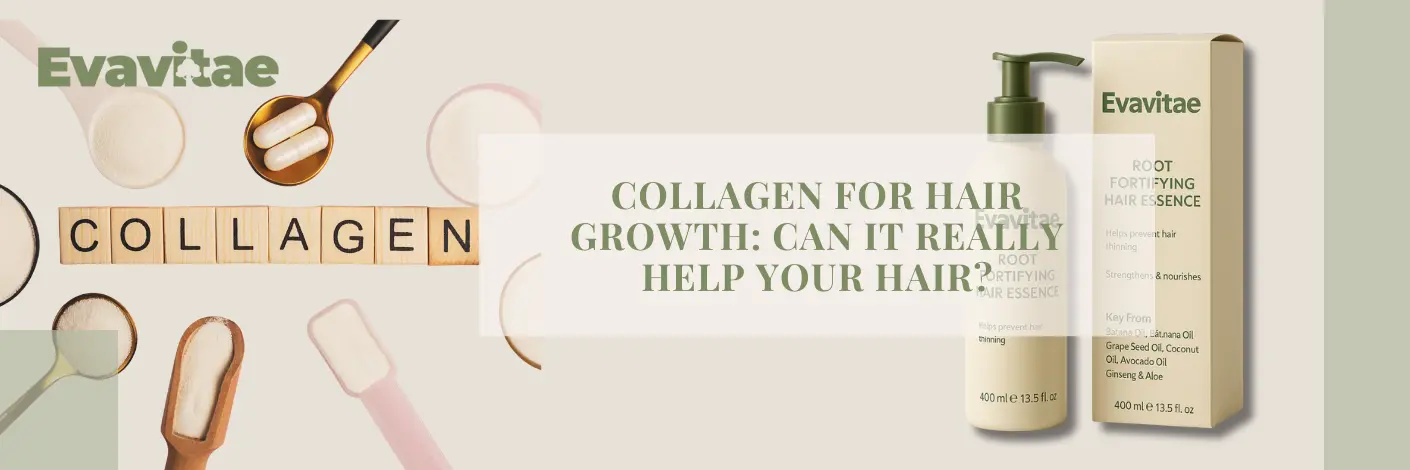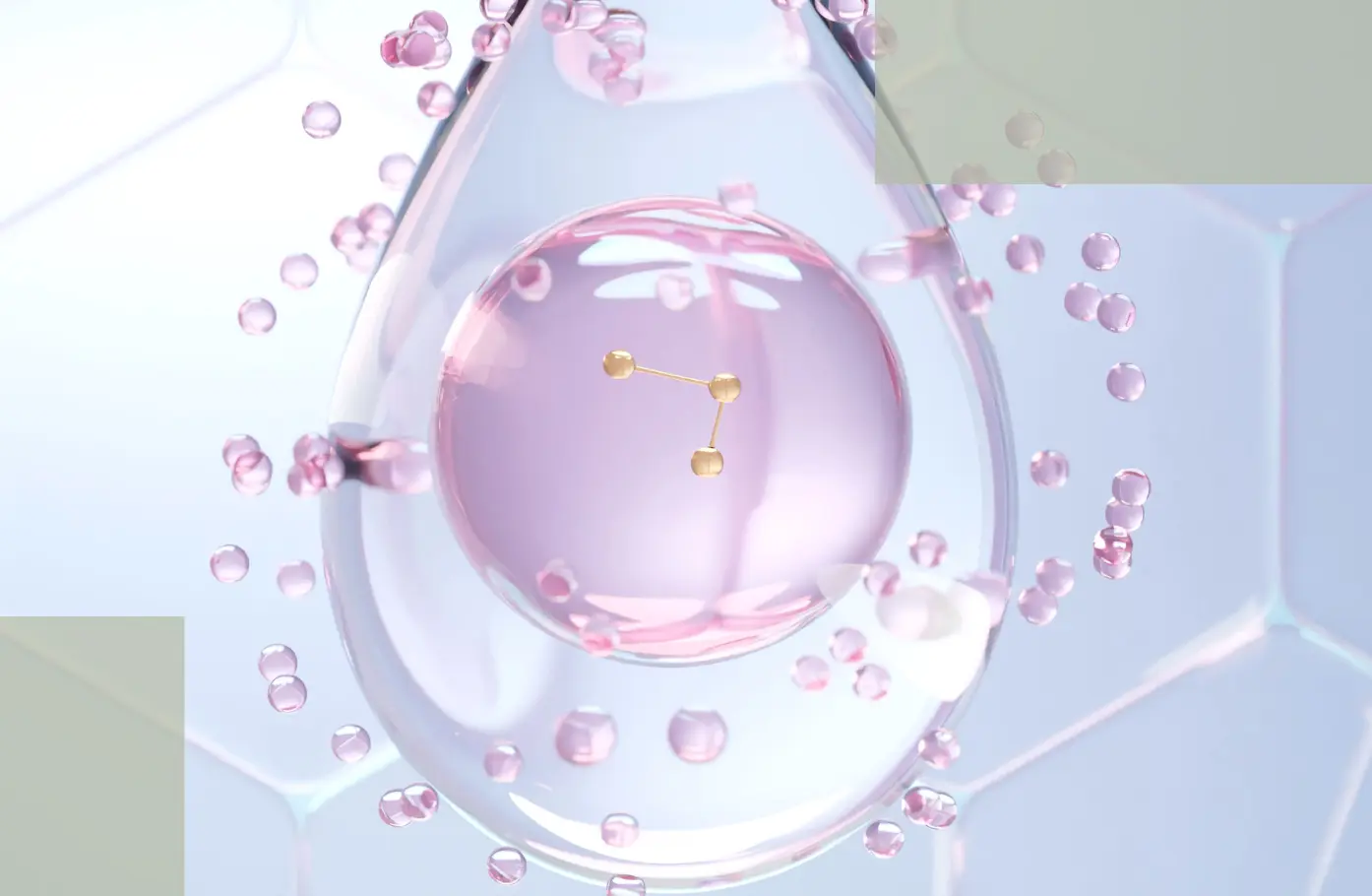What Is Collagen?
Collagen is the most abundant protein in the human body, making up about 30% of the body’s protein content. It serves as a primary structural component for skin, bones, tendons, and connective tissue. In the context of hair, collagen plays an indirect but important role—it doesn’t form the hair shaft directly but supports the surrounding tissues, particularly the dermis and scalp environment, where hair follicles reside (Proksch et al., 2014).
How Collagen Supports Hair Follicles
Hair follicles rely on a strong and healthy dermal layer to anchor and nourish hair. Collagen contributes to this in several ways:
- Structural Support for the Scalp
Collagen helps maintain skin elasticity and strength, preventing scalp thinning that can compromise follicle stability.
- Amino Acid Supply
Collagen contains amino acids like proline, which are also found in keratin—the primary protein in hair. By supplying these building blocks, collagen may help sustain hair structure.
- Antioxidant Protection
Some research suggests collagen has antioxidant properties, which can help protect hair follicle cells from damage caused by free radicals, a factor linked to hair aging (Shigemura et al., 2018).
Collagen and the Hair Growth Cycle
Hair grows in a cycle: anagen (growth), catagen (transition), and telogen (resting). While collagen doesn’t directly speed up this cycle, it can contribute to the quality of new hair produced by maintaining a healthy scalp and follicular environment. Poor scalp health, inflammation, or weakened connective tissue can disrupt the cycle, leading to thinning hair over time.
Natural Decline of Collagen With Age
One key reason collagen is linked to hair health is the fact that collagen production declines naturally with age. Starting in our mid-20s, we lose about 1% of collagen per year, and environmental factors like UV exposure, poor diet, and smoking can accelerate this loss. This reduction affects skin firmness and scalp integrity, which may indirectly impact hair density.
Best Sources of Collagen for Hair Health
Collagen can be obtained through dietary sources and supplements.
1. Food Sources
- Bone broth – Rich in collagen and minerals.
- Fish skin – Contains marine collagen peptides, which may be absorbed more efficiently.
- Egg whites – Provide proline, a key amino acid for collagen.
- Chicken skin and cartilage – Naturally high in collagen.
2. Supplements
Collagen supplements are available as powders, capsules, and drinks. Hydrolyzed collagen (collagen peptides) is preferred for better absorption. Clinical studies show that collagen peptide supplementation can improve skin elasticity and hydration, which may benefit scalp health (Asserin et al., 2015).
Collagen vs. Other Hair Growth Nutrients
While collagen supports the scalp and skin, it’s not the only nutrient linked to hair health. Vitamins like biotin, vitamin D, iron, and zinc are also essential for healthy hair growth. A well-rounded nutritional approach is more effective than relying on collagen alone.
How to Maximize Collagen’s Benefits for Hair
- Pair Collagen With Antioxidants
Vitamin C is essential for collagen synthesis. Eating foods rich in vitamin C—like citrus fruits, strawberries, and bell peppers—can boost your body’s ability to produce collagen.
- Maintain a Healthy Scalp
Even with collagen supplementation, an unhealthy scalp environment (due to dandruff, seborrhoeic dermatitis, or excessive oil buildup) can hinder hair growth.
- Avoid Collagen-Damaging Habits
Smoking, high sugar intake, and excessive UV exposure can break down collagen faster, limiting its potential benefits.
How to Identify a Vitamin Deficiency Causing Hair Loss
Pair Collagen With Antioxidants
Vitamin C is essential for collagen synthesis. Eating foods rich in vitamin C—like citrus fruits, strawberries, and bell peppers—can boost your body’s ability to produce collagen.
Maintain a Healthy Scalp
Even with collagen supplementation, an unhealthy scalp environment (due to dandruff, seborrhoeic dermatitis, or excessive oil buildup) can hinder hair growth.
Avoid Collagen-Damaging Habits
Smoking, high sugar intake, and excessive UV exposure can break down collagen faster, limiting its potential benefits.
Does the Science Support Collagen for Hair Growth?
While there’s growing evidence linking collagen supplementation to skin and joint benefits, the research specifically on collagen and hair growth is still emerging. Some studies have found improved hair thickness and shine after collagen intake, but most attribute these benefits to enhanced scalp health rather than directly stimulating follicles.
For example, a 2021 review in Nutrients suggests collagen’s amino acid profile supports keratin production, but acknowledges more targeted studies are needed for hair-specific outcomes (Papakonstantinou et al., 2021).
Who Might Benefit Most?
- Aging individuals experiencing collagen decline.
- Postpartum women facing both hormonal and structural changes in scalp health.
- People recovering from illness or stress-related hair shedding where scalp repair is essential.
Potential Downsides of Collagen
Collagen supplements are generally safe, but they are animal-derived, which may be a concern for vegetarians and vegans. Additionally, individuals with certain allergies (fish, eggs) should choose their source carefully.
Final Thoughts
Collagen is not a magic bullet for hair growth, but it plays a valuable supportive role in maintaining a healthy scalp and strong hair structure. When combined with a nutrient-rich diet, scalp care, and good lifestyle habits, collagen can be a helpful addition to a holistic hair health routine.
For more in-depth information on collagen’s role in skin and hair health, check this review from the National Institutes of Health: NIH – Collagen and Skin Aging
To promote healthy hair growth, it’s recommended to use a gentle, non-irritating shampoo. I recommend Evavitae shampoo. Check its ingredient list to see its natural, healthy ingredients. If you’re willing to invest more time in your haircare routine, you can also try its hair care kit.
Explore gentle recovery steps and dermatologist insights in the Complete Postpartum Hair Regrowth Hub.
📚 References (APA Format)
Asserin, J., Lati, E., Shioya, T., & Prawitt, J. (2015). The effect of oral collagen peptide supplementation on skin moisture and the dermal collagen network: Evidence from an ex vivo model and randomized, placebo-controlled clinical trials. Journal of Cosmetic Dermatology, 14(4), 291–301. https://doi.org/10.1111/jocd.12174
Papakonstantinou, E., Roth, M., & Karakiulakis, G. (2021). Collagen: The main structural protein in the extracellular matrix of the skin. Nutrients, 13(11), 4321. https://doi.org/10.3390/nu13114321
Proksch, E., Schunck, M., Zague, V., Segger, D., Degwert, J., & Oesser, S. (2014). Oral intake of specific bioactive collagen peptides reduces skin wrinkles and increases dermal matrix synthesis. Skin Pharmacology and Physiology, 27(3), 113–119. https://doi.org/10.1159/000355523
Shigemura, Y., Iwai, K., Morimatsu, F., Iwamoto, T., Mori, T., Oda, C., … Sato, K. (2018). Effect of Pro-Hyp, a collagen-derived dipeptide, on hair follicle cell proliferation. Bioscience, Biotechnology, and Biochemistry, 82(5), 920–922. https://doi.org/10.1080/09168451.2018.1433037
Evavitae products are now available exclusively at www.evavitae.com.





Add comment
You must be logged in to post a comment.